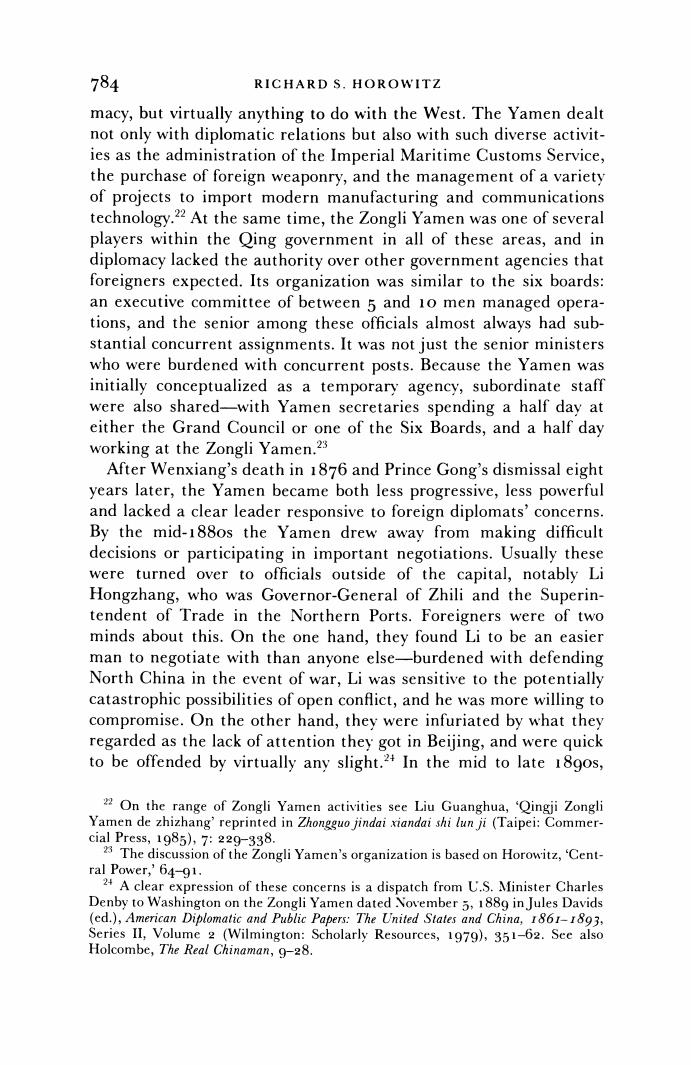正在加载图片...

784 RICHARD S.HOROWITZ macy,but virtually anything to do with the West.The Yamen dealt not only with diplomatic relations but also with such diverse activit- ies as the administration of the Imperial Maritime Customs Service, the purchase of foreign weaponry,and the management of a variety of projects to import modern manufacturing and communications technology.22 At the same time,the Zongli Yamen was one of several players within the Qing government in all of these areas,and in diplomacy lacked the authority over other government agencies that foreigners expected.Its organization was similar to the six boards: an executive committee of between 5 and 1o men managed opera- tions,and the senior among these officials almost always had sub- stantial concurrent assignments.It was not just the senior ministers who were burdened with concurrent posts.Because the Yamen was initially conceptualized as a temporary agency,subordinate staff were also shared-with Yamen secretaries spending a half day at either the Grand Council or one of the Six Boards,and a half day working at the Zongli Yamen.25 After Wenxiang's death in 1876 and Prince Gong's dismissal eight years later,the Yamen became both less progressive,less powerful and lacked a clear leader responsive to foreign diplomats'concerns. By the mid-188os the Yamen drew away from making difficult decisions or participating in important negotiations.Usually these were turned over to officials outside of the capital,notably Li Hongzhang,who was Governor-General of Zhili and the Superin- tendent of Trade in the Northern Ports.Foreigners were of two minds about this.On the one hand,they found Li to be an easier man to negotiate with than anyone else-burdened with defending North China in the event of war,Li was sensitive to the potentially catastrophic possibilities of open conflict,and he was more willing to compromise.On the other hand,they were infuriated by what they regarded as the lack of attention they got in Beijing,and were quick to be offended by virtually any slight.2+In the mid to late 18gos, 22 On the range of Zongli Yamen activities see Liu Guanghua,Qingji Zongli Yamen de zhizhang'reprinted in Zhongguo jindai xiandai shi lun ji (Taipei:Commer- cial Press,.1985),7:229-338. 23 The discussion of the Zongli Yamen's organization is based on Horowitz,Cent- ral Power,'64-91. 24 A clear expression of these concerns is a dispatch from U.S.Minister Charles Denby to Washington on the Zongli Yamen dated November 5,1889 in Jules Davids (ed.),American Diplomatic and Public Papers:The United States and China,1861-1893. Series II,Volume 2(Wilmington:Scholarly Resources,1979),351-62.See also Holcombe,The Real Chinaman,9-28.784 RICHARD S. HOROWITZ macy, but virtually anything to do with the West. The Yamen dealt not only with diplomatic relations but also with such diverse activities as the administration of the Imperial Maritime Customs Service, the purchase of foreign weaponry, and the management of a variety of projects to import modern manufacturing and communications technology.22 At the same time, the Zongli Yamen was one of several players within the Qing government in all of these areas, and in diplomacy lacked the authority over other government agencies that foreigners expected. Its organization was similar to the six boards: an executive committee of between 5 and io men managed operations, and the senior among these officials almost always had substantial concurrent assignments. It was not just the senior ministers who were burdened with concurrent posts. Because the Yamen was initially conceptualized as a temporary agency, subordinate staff were also shared-with Yamen secretaries spending a half day at either the Grand Council or one of the Six Boards, and a half day working at the Zongli Yamen.23 After Wenxiang's death in 1876 and Prince Gong's dismissal eight years later, the Yamen became both less progressive, less powerful and lacked a clear leader responsive to foreign diplomats' concerns. By the mid-188os the Yamen drew away from making difficult decisions or participating in important negotiations. Usually these were turned over to officials outside of the capital, notably Li Hongzhang, who was Governor-General of Zhili and the Superintendent of Trade in the Northern Ports. Foreigners were of two minds about this. On the one hand, they found Li to be an easier man to negotiate with than anyone else-burdened with defending North China in the event of war, Li was sensitive to the potentially catastrophic possibilities of open conflict, and he was more willing to compromise. On the other hand, they were infuriated by what they regarded as the lack of attention they got in Beijing, and were quick to be offended by virtually any slight." In the mid to late 189os, 22 On the range of Zongli Yamen activities see Liu Guanghua, 'Qingji Zongli Yamen de zhizhang' reprinted in Zhongguojindai xiandai shi lunji (Taipei: Commercial Press, 1985), 7: 229-338. 2" The discussion of the Zongli Yamen's organization is based on Horowitz, 'Central Power,' 64-91. 24 A clear expression of these concerns is a dispatch from U.S. Minister Charles Denby to Washington on the Zongli Yamen dated November 5, 1889 in Jules Davids (ed.), American Diplomatic and Public Papers: The United States and China, 1861-1893, Series II, Volume 2 (Wilmington: Scholarly Resources, 1979), 351-62. See also Holcombe, The Real Chinaman, 9-28